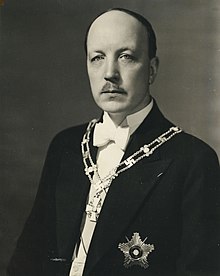
Back ريستو روتي Arabic ريستو روتى ARZ Risto Heikki Ryti AST Рыста Руці Byelorussian Рыста Руці BE-X-OLD Ристо Рюти Bulgarian Risto Ryti Czech Risto Ryti Danish Risto Ryti German Risto Ryti DIQ
Risto Ryti | |
|---|---|
 | |
| 5th President of Finland | |
| In office 19 December 1940 – 4 August 1944 | |
| Prime Minister | Jukka Rangell Edwin Linkomies |
| Preceded by | Kyösti Kallio |
| Succeeded by | Gustaf Mannerheim |
| 14th Prime Minister of Finland | |
| In office 1 December 1939 – 19 December 1940 | |
| President | Kyösti Kallio |
| Preceded by | Aimo Cajander |
| Succeeded by | Jukka Rangell |
| Minister of Finance | |
| In office 14 November 1922 – 18 January 1924 | |
| Prime Minister | Kyösti Kallio |
| Preceded by | Ernst Gråsten |
| Succeeded by | Hugo Relander |
| In office 9 April 1921 – 2 June 1922 | |
| Prime Minister | Juho Vennola |
| Preceded by | Jonathan Wartiovaara |
| Succeeded by | Ernst Gråsten |
| Personal details | |
| Born | Risto Heikki Ryti 3 February 1889 Huittinen, Grand Duchy of Finland, Russian Empire |
| Died | 25 October 1956 (aged 67) Helsinki, Finland |
| Political party | National Progressive |
| Spouse | Gerda Ryti (née Serlachius) |
| Children | Henrik Ryti Niilo Ryti Eva Saxén (née Ryti) |
| Signature |  |
Risto Heikki Ryti (Finnish pronunciation: [ˈristo ˈhei̯kːi ˈryti]; 3 February 1889 – 25 October 1956) was a Finnish politician who served as the fifth president of Finland from 1940 to 1944.[1] Ryti started his career as a politician in the field of economics and as a political background figure during the interwar period. He made a wide range of international contacts in the world of banking and within the framework of the League of Nations. Ryti served as prime minister during the Winter War and the Interim Peace, and as president during the Continuation War.
Ryti penned the 1944 Ryti–Ribbentrop Agreement – named after himself and Joachim von Ribbentrop – a personal letter to Nazi German Führer Adolf Hitler whereby Ryti agreed not to reach a separate peace in the Continuation War against the Soviet Union without approval from Nazi Germany, in order to secure German military aid for Finland to stop the Soviet Vyborg–Petrozavodsk Offensive against Finland.[2] His resignation soon afterwards allowed his successor, Carl Gustaf Emil Mannerheim, to bypass the agreement and make peace with the Soviet Union once the offensive had been stopped.
After the war, Ryti was the main defendant in the Finnish war-responsibility trials (1945–1946),[3] which resulted in his conviction for crimes against peace. He was sentenced to ten years' imprisonment but was pardoned by decision of President Juho Kusti Paasikivi in 1949. His reputation was largely unscathed, but his health had suffered and he never returned to public life.
- ^ "Ministerikortisto". Valtioneuvosto.[permanent dead link]
- ^ Jokisipilä, Markku (2004). Aseveljiä vai liittolaisia (in Finnish). SKS. ISBN 951-746-609-9.
- ^ Turtola (2000), p. 403.